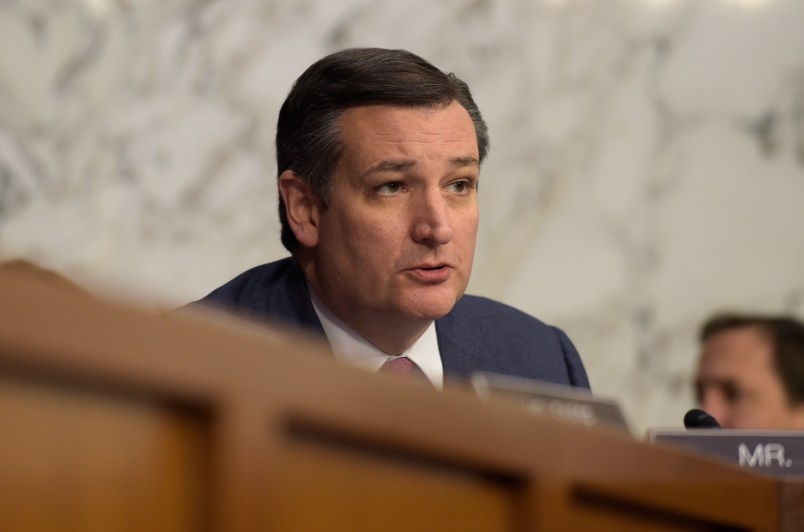As Congress enters its final stretch before the August recess—the deadline the Senate has imposed on passing its Obamacare repeal bill—the next round of negotiations appears to be focused a proposal being offered by Sen. Ted Cruz (R-TX) that would put in jeopardy some of the Affordable Care Act’s protections for pre-existing conditions.
At least one conservative senator, Sen. Mike Lee (R-UT), has drawn a hard line in support of including the proposal in the final package, and outside groups are amping up the pressure to see it added. However, Republican rank-and-file and even GOP Senate leadership has hinted that tweaks to the amendment may be needed to get the broader conference to swallow it, amidst the other side deals being offered to earn 50 votes in support.
Under the Cruz amendment, the Consumer Freedom Option, insurers would be allowed to sell stingy—albeit cheaper—plans that do not comply with Obamacare regulations as long as they sell at least one compliant plan that includes all of the ACA’s pre-existing conditions protections. Such a system invites severe market segmentation and without a massive amount of government assistance, sick people who need the ACA-compliant plans may be priced out of the market entirely.
As with the Obamacare repeal legislation as a whole, tweaks to the proposal may stand to create new problems, and what it would take to earn the support of the GOP conference’s far-right flank risks losing votes at its center.
A top Republican suggested that some adjustments to the Cruz amendment would be necessary, for policy reasons and not just for the politics.
“Otherwise, what you do is have adverse selection,” Sen. John Cornyn (R-TX), the majority whip, told reporters Monday evening. “Younger healthy people pick the cheaper policy, leaving older, sicker people on the other policy, which would have to be subsidized dramatically in order to make it affordable.”
The Cruz amendment has been sent to the CBO for analysis that leadership hopes to present in the days to come to determine whether the Senate GOP conference—with many Republicans wary of breaking their vows to protect pre-existing conditions—can stomach it.
“It’s an effort to get conservative votes, but would probably lose some moderate votes,” Sen. Chuck Grassley (R-IA) told TPM. He wouldn’t answer directly when asked if it would lose his vote.
“With 72,000 Iowans that can’t get health insurance, that I have to consider what it takes to have that happen,” he said.
It has gotten support of Vice President Mike Pence and also surprising rank-and-file members like Sen. Jeff Flake (R-AZ). But others are warning it may be a bridge too far.
“I’m not sure it has the oomph to make it,” Senate Finance Committee Chairman Orrin Hatch (R-UT) told Politico.
One idea being tossed around to make it more appetizing is a tweak from Sen. Mike Rounds (R-SD) that would tether the price of the most expensive plan under Cruz’s scheme to its cheapest. Cruz gave reporters his generic “there continue to be productive conversations” line, when asked about the idea Monday, while Lee told Politico that the Rounds discussion was “news to me.”
Rounds’ proposal got named checked by the Senate GOP’s No. 3, Sen. John Thune (R-SD), who, according to the Hill, said that Cruz proposal “has to be structured in a way that ensures that the pools aren’t adversely affected.” Cornyn also said it was an idea they were entertaining.
But other Republicans are throwing out their own asks to go alongside with the Cruz amendment. Sen. Ron Johnson (R-WI) told TPM that the tax credits for insurance alone were not enough government assistance and he would like to see some sort of invisible risk program—akin to what was operated by Maine before the ACA—implemented on a larger scale.
“The American public, I think, has spoken and said, ‘We want to cover people with pre-existing conditions and obviously people with high cost conditions,’ but the flawed architecture of Obamacare forced roughly 5-7 percent of the population to pay for all that,” he said.







Dr. Cruz sez: Just eat Green Eggs and Ham every day, and you’ll be fine.
So make the most expensive policy in a region no more than 15% more expensive than the cheapest. Heck, mandate that they cost the same.
Time to legalize and allow automated white christian-prayer based health plans. A computer recording will pray for your recovery.
What they are really toying around with here (without making it explicit) is the notion that young, healthy, people should be able to buy “low premium” health insurance that’s appropriate for their risk tolerance and risks. On the face of it, this is kinda like buying collision and comp for a new car but not for a 20 year old beater. It makes sense. For the customer. And a good political pander to those voters. But the problem is that these folks won’t be self-insuring if something outside the bounds of what they insured against comes to pass. If you wreck your car but don’t have Collision, it’s on you. If they wind up in the ER with a chronic and life-threatening heart condition “rare at their age” or accidentally get pregnant, with triplets, it probably won’t be on them.
They are also implicitly toying with the question of whether the young and healthy (and, to the extreme case, the celibate or abstain-ate, or birth control users) should subsidize the old and less healthy (and reproducing). And this seems like an argument of “fairness”. But it’s the same argument for ANY taxation from one to benefit all or others. Why should the Blue states subsidize the Red states?
One of the first pieces to be ripped out of the ACA (by the GOP) was the reinsurance. And Ron, I’ll bet I know what your vote was on that one… (&#@*$$!)